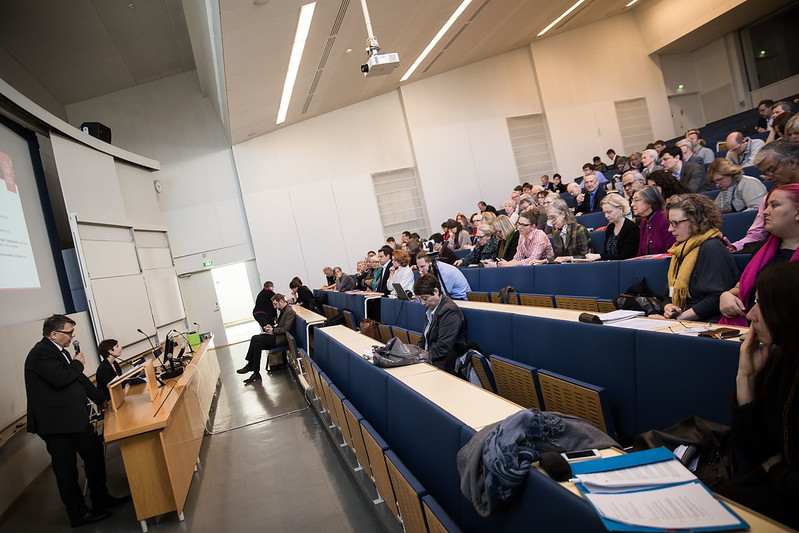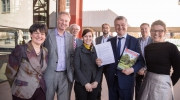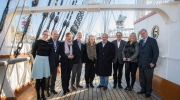Forum in Turku: “Participation is at the heart of a human rights approach to cultural heritage”
On 13 May at the University of Turku, Europa Nostra Finland, in cooperation with Europa Nostra, held an interesting Forum on citizens’ participation in decision making related to heritage. Experts, professionals and activists in the fields of heritage and cultural rights expressed their views on this key topic and presented innovative cases from various European countries, from Finland to Russia. Mylène Bidault, Vice-President of the Observatory of Cultural Diversity and Cultural Rights (France/Switzerland), made a keynote speech on heritage and participation as matters of human rights, while Lia Ghilardi, Noema Culture & Place Mapping (UK/Italy), spoke about cultural planning for sustainable and creative communities. Karima Bennoune, United Nations Special Rapporteur in the field of Cultural Rights (USA), contributed through a video message to the discussion. This full-day Forum culminated with the presentation of the Turku Manifesto on 14 May at the Sigyn Hall in the presence of Markku Markkula, President of the European Committee of the Regions.
The keynote session opened with a video message by Karima Bennoune. She thanked Europa Nostra and its President Maestro Plácido Domingo for their support for the mandate of the Special Rapporteur in the field of Cultural Rights, and in particular the work on cultural heritage. “This support is greatly appreciated and has made a significant contribution. I look forward to our continued collaboration toward our shared goals of defending cultural rights,” stated Karima Bennoune. The President of Europa Nostra contributed via a video message for the event ‘Time to end Intentional Destruction of Cultural Heritage: A Human Rights Call to Action’, during which the latest UN Report on Cultural Rights was presented by the Special Rapporteur, on 27 October 2016 at the UN Headquarters in New York.
“It is essential to understand cultural heritage not only as a technical issue but also as a human rights issue. At the heart of a human rights approach are the questions of participation and consultation. I have always emphasised the need for consultation with all relevant stakeholders – whether at the local, national, regional or international levels – in regards to the diverse meanings of heritage, its interpretations, uses, and about all aspects of its protection, preservation, reconstruction, memorialisation and even nomination to the UNESCO World Heritage List,” noted Karima Bennoune.
“Without the continuous engagement and creativity of diverse people, cultural heritage is doomed to die. The best protection for heritage ultimately is found both in the work of local cultural heritage defenders and experts whom we must find effective ways to support, and in the commitment of populations that are engaged and involved. (…) It is up to all of us to work together to increase participation and involvement in heritage protection,” concluded the UN Special Rapporteur in the field of Cultural Rights.
Video message by Karima Bennoune
The full text of the video message can be read here
In her keynote presentation, the Vice-President of the Observatory of Cultural Diversity and Cultural Rights, emphasised: “Defining cultural heritage from a cultural rights perspective means that cultural heritage is what counts for people, not necessarily what is of outstanding value.”
Mylène Bidault explained that a human rights based approach to cultural heritage calls for a shift in perspective, from responding to the needs of diverse people to recognising their capacities, rights and obligations. “Individuals and communities cannot be seen as mere beneficiaries or users of cultural heritage. Access and enjoyment also imply contributing to the identification, interpretation and development of cultural heritage, as well as to the design and implementation of preservation programmes,” she said.
In her keynote presentation on cultural planning for sustainable and creative communities, Lia Ghilardi, Noema Culture & Place Mapping, stressed the importance of developing and implementing a holistic approach to making cities for all. “The culture of the places in all their aspects, from tangible to intangible, is the basis for building cohesive cities. Planning culturally is about mobilising the distinctiveness of a place in order to create more opportunities for people to work, play and grow as citizens,” she highlighted.
According to Lia Ghilardi, cities that implement successful cultural plans have a deep understanding of their unique resources (people, places, history, culture, and the economy); are determined to shape their own destiny; regularly assess their resources, prospects and potential for the future; work across departments and levels of government to achieve their aims; take calculated risks; and share their experience with other parties.
During the full-day Forum, innovative cases of citizens’ participation in decision making related to heritage from several European countries, namely Cyprus, Denmark, Estonia, Finland, Ireland, Italy, Latvia, Norway, the Netherlands, United Kingdom, and Russia were presented.
In the keynote session, the project York Past and Present (UK) was shared by Helen Graham, Associate Professor in In/tangible Heritage at the University of Leeds, together with Lianne Brigham and Richard Brigham, whilst the White City Project (Russia) was explained by Elena Olshanskaya.
The afternoon session consisted of three parallel workshops:
1) New Tools for Heritage Activism, moderated by Piet Jaspaert, Vice-President of Europa Nostra (Belgium), and Tapani Mustonen, Chairman of Europa Nostra Finland – Watch video Workshop 1
2) How to Commit People and Why?, moderated by Costa Carras, Vice-President of Europa Nostra (Greece), and Suzie Thomas, University Lecturer at University of Helsinki (Finland) – Watch video Workshop 2
3) Human Rights and Legislation, moderated by Peter Collins, Chairman of Europa Nostra UK, and Anita Vaivade, Latvian Academy of Culture (Latvia). – Watch video Workshop 3
The Concluding session included a panel discussion moderated by Maunu Hayrynen, Professor of Landscape Studies at the University of Turku and Chair of the Forum (Finland), with the participation of the keynote speakers as well as Araceli Pereda Alonso, President of Hispania Nostra (Spain), and Astrid Weij, Board Member of Europa Nostra (The Netherlands).
Watch video Concluding session







